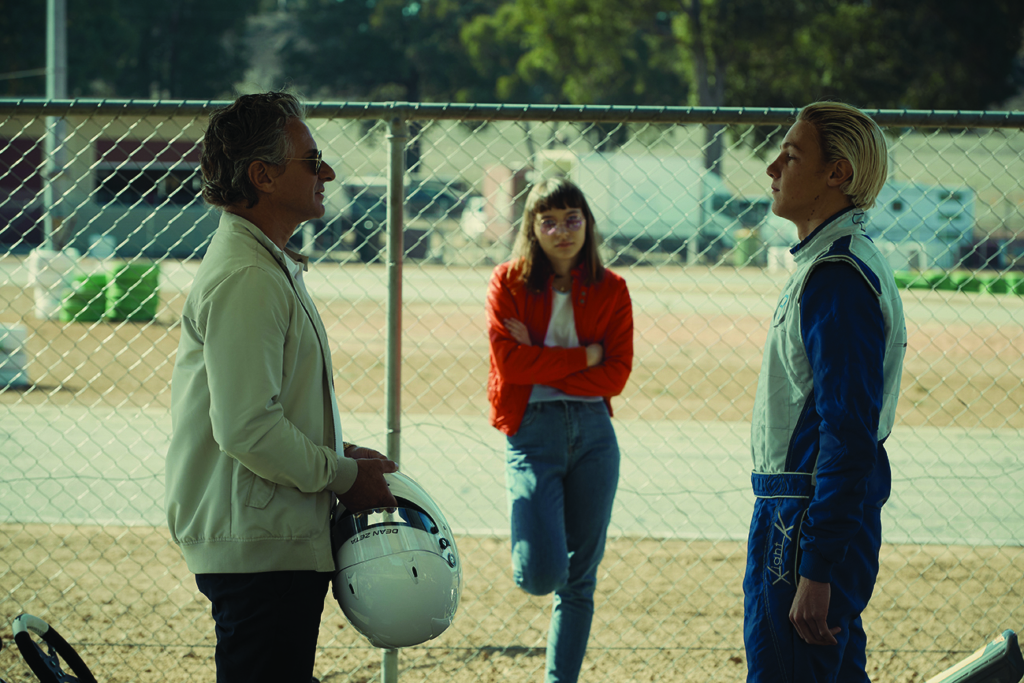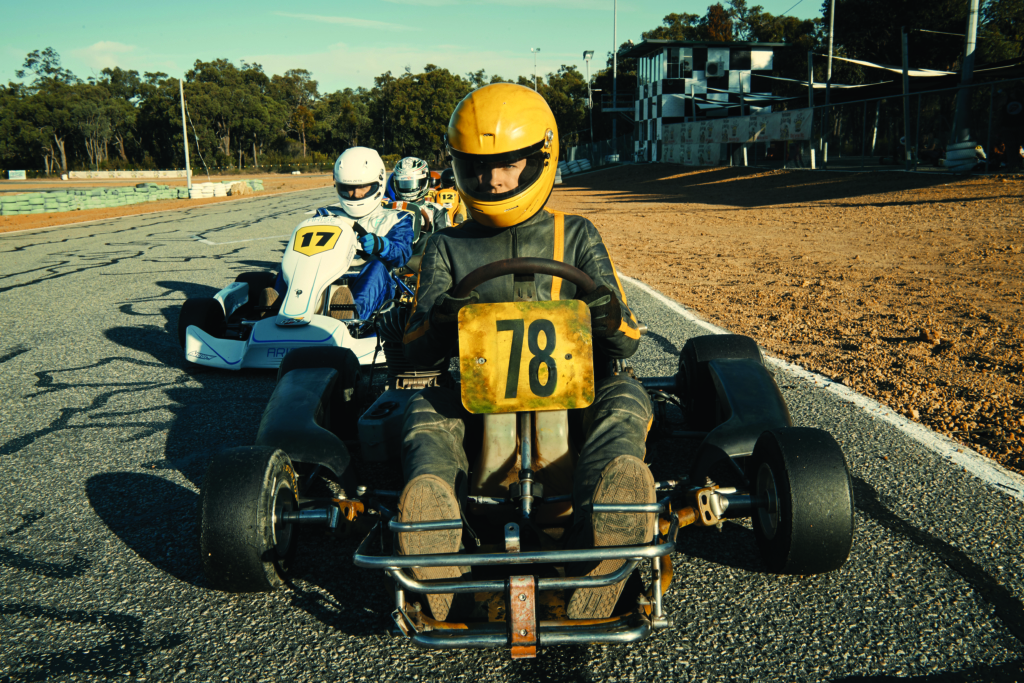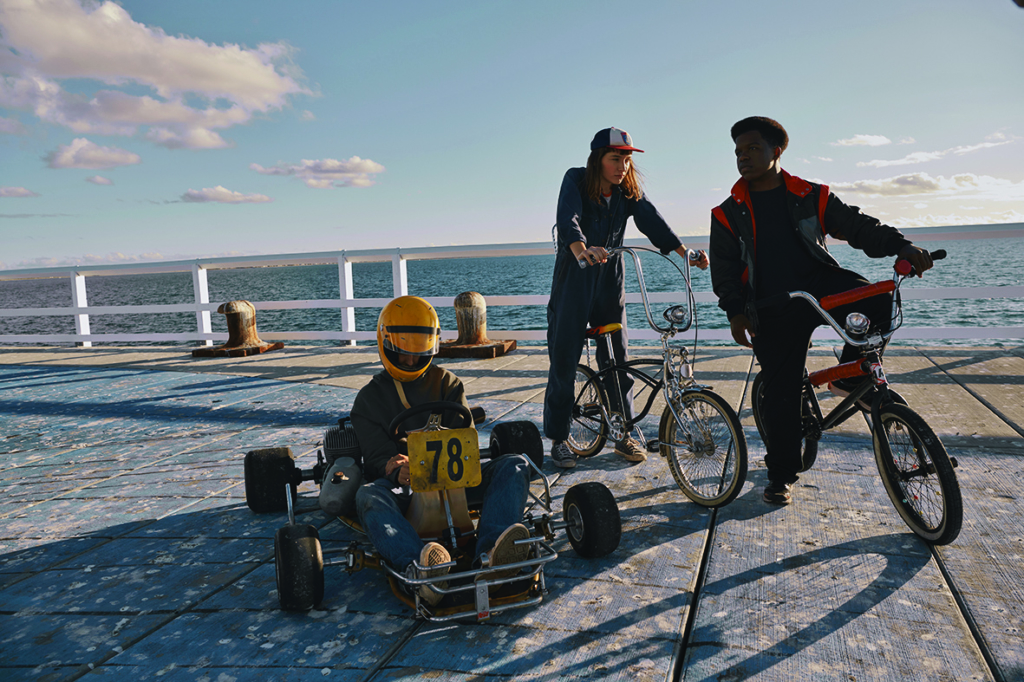Film critic Simon Foster jokingly referred to this latest piece of youth-oriented Australian cinema as ‘The Kart-y Kid’,[1]Simon Foster, ‘Go!’, Screen-Space, 17 January 2020, <http://screen-space.squarespace.com/reviews/2020/1/17/go.html>, accessed 28 May 2020. and, frankly, there is no more apt sobriquet close to hand. Go! (Owen Trevor, 2020), titled Go Karts prior to its theatrical release, is a punchy, amiable teen dramedy that draws so heavily on John G Avildsen’s 1984 crowd-pleaser The Karate Kid, for both narrative structure and emotional pathos, that original screenwriter Robert Mark Kamen is surely owed at the very least a ‘special thanks’ credit.
Indeed, at first glance, the raw narrative building blocks are almost identical. Having moved across the country to the small Western Australian coastal town of Busselton, sixteen-year-old Jack Hooper (played by newcomer William Lodder) tries to integrate himself into the local youth population while his mother, Christie (Frances O’Connor), sets up shop. Here, go-kart racing is the teen pastime du jour, and Jack quickly comes into conflict with local bully and champion racer Dean Zeta (Cooper van Grootel). To earn his place in his new home town, Jack must prove himself on the track owned by gruff local recluse Patrick (Richard Roxburgh), who also agrees to mentor him in the art and science of go-kart driving.

The parallels are plain: Jack is Daniel LaRusso (Ralph Macchio), Patrick is Mr Miyagi (Pat Morita) – to the point of having a similarly tragic backstory – and Dean is Johnny Lawrence (William Zabka), complete with a sinister mentor-figure in the form of his father, racing magnate Mike (Damian de Montemas), and an emotional connection with Jack’s love interest, Mandy (Anastasia Bampos) – although Go! differentiates itself from the earlier film by having her be Dean’s sister, not his girlfriend. Also added to the mix is a comedy-relief sidekick, Colin (Darius Amarfio Jefferson), who helps Jack on his quest to beat Dean at the state championships, dropping frequent comic non sequiturs along the way.
Screenwriter Steve Worland, who also co-penned Robert Connolly’s popular 2014 children’s film Paper Planes, cleaves to the original model. Like Morita’s Mr Miyagi, Roxburgh’s Patrick puts Jack through a training regime involving a number of menial maintenance tasks that later prove to have beneficial effects in competition – painting a building with a brush strapped to his head helps him better withstand the g-force of tight cornering, for example. In this scene, Jack explicitly refers to Patrick as Mr Miyagi, the film at hand at least having the self-awareness to acknowledge its debt to its VHS-era predecessor.

The whole thing builds to a well-staged if predictable climax, with Jack taking first place at the national championships (although there’s no racetrack equivalent of the crane kick in sight), and it can be seen, charitably, as a derivative but adept Australian entry into the familiar coming-of-age sports drama subgenre, robust but unremarkable. However, several elements in play elevate Go! above the norm.
The first and most obvious occurs at the aesthetic level. Trevor, working with cinematographers Peter Eastgate and Rick Rifici, excels at depicting objects in motion with both clarity and a palpable sense of momentum, which is to be expected; after all, his résumé to date primarily consists of directing some twenty-six episodes of popular petrolhead light-entertainment series Top Gear, whose entire raison d’être is depicting the sheer adrenalised joy of finely-tuned machines operating at high speed. For Go!, this means the numerous racing sequences are meticulously and effectively constructed, with close attention paid to spatial relationships and staging, eschewing the now-decades-long elevation of shaky handheld camerawork and extremely rapid editing to forefront motion and speed at the cost of simple comprehension.
Trevor, working with cinematographers Peter Eastgate and Rick Rifici, excels at depicting objects in motion with both clarity and a palpable sense of momentum.
Trevor takes this further, however, with many dialogue-driven scenes that could have been static instead set in motion. There’s more than a touch of the ‘kids on bikes’ subgenre to Go! – see perennial 1980s favourites E.T. the Extra-Terrestrial (Steven Spielberg, 1982) and The Goonies (Richard Donner, 1985) for older examples of the type, and Netflix’s hugely popular Stranger Things for the current reigning champion. Jack, Mandy and Colin are frequently riding when talking, and even their nemesis, Dean, rides with his adolescent henchmen Ted (Rhys Landa) and Ralph (Jack Connell), although they get dirt bikes, echoing the financial and technical edge that the Zetas’ Arise Racing team has on our scrappy, DIY heroes. Eventually, when the mandatory romantic subplot rears its head and Jack tentatively courts Mandy, their first date takes place at a skating rink. Whenever possible, Trevor either fills his frame with motion or else moves the camera itself, giving Go! a kind of constant kinetic rhythm even when off the track.

But it’s on the thematic level that things get really interesting, and while, structurally, Worland’s script is familiar and functional, it weaves a constant motif of past trauma into, if not every scene, then certainly into almost every character. Jack, we learn fairly quickly, is still grieving for his father, who is strongly implied to have died by suicide prior to the beginning of the film. The two shared a love of cars and bonded over doing doughnuts in empty parking lots at night – something Jack still occasionally ‘borrows’ his mother’s car to do. Jack is haunted by the old man’s absence, but also competes with his memory to some degree, trying to shoulder the burden of being the man of the house while still being a teenager. This is dramatised by having Jack race his father’s old avatar in a car-racing videogame, trying to overcome a literal and virtual ghost.
Jack’s grizzled new father-figure has demons of his own. A former racing champion now reduced to living in a dilapidated caravan and hosting children’s birthday parties at his run-down racing track, Patrick – it is eventually revealed – accidentally killed a racing teammate when, mid-race, he put his own personal win ahead of the team’s, a tragedy that saw him hang up his racing gloves for good. There’s a hint that he perhaps had a romantic relationship with his old teammate; he keeps a photo of them together in his caravan, and somewhat guardedly refers to him as ‘a man who was very important to me’, leaving the exact nature of their dynamic intriguingly ambiguous. None of this impacts on the narrative action of the rest of the film in any particularly concrete way, but even the suggestion of queer representation in the still-rather-straitened realm of family-friendly cinema is welcome. In more direct and practical terms, Jack’s prodigious driving skills and championship ambitions represent a shot at redemption for Patrick – a chance to build something new and successful out of the detritus of the past.

Which is a thing that literally happens in Go!. Finding almost enough parts to construct their own kart while cleaning out a shed at Patrick’s track, Jack and Colin attempt to put it together. Finding the task too much for them, they enlist Mandy’s help. For her part, the past that is hampering her is not directly personal, but familial and cultural. Mandy is a gifted mechanic, but her brother, groomed to win, is the apple of her father’s eye, while she is relegated to busywork at Arise Racing. Stymied by the hidebound and moribund attitudes of the Arise engineers, who baulk at taking on board any suggestions or innovations from a teen girl, she agrees to help Colin and Jack in exchange for acting as their chief engineer – an opportunity denied her by her father.
This kind of team melodrama trucks in big emotions and big moments, both awash in hormones; and Trevor and his cast more than sell those elements.
Even less prominent character arcs work to support this theme of growth, rebirth and renewal. A subplot involves Jack acting as matchmaker between his mother and tongue-tied but big-hearted local cop Barry (Dan Wyllie), coaching the latter on the tastes of the former and encouraging him to ask her on a date. Barry comes into their lives by catching Jack illegally doing doughnuts in Christie’s car late one night – a rebellious act rooted in past trauma that, modified, leads to new opportunities. Even Colin, who possesses perhaps the shallowest character arc of the main ensemble, mainly relegated to dropping awkward one-liners while the main drama plays out adjacent to him, must learn to not take the cruel barbs of Dean’s coterie of bullies on the chin.

Running parallel to this is the idea of the group being more important than the individual – or, perhaps more accurately, the individual being incomplete without the group. Arriving in a new town, Jack is, in essence, building himself a family of choice to replace what he feels he has lost (and it’s interesting that he splits the patriarch position, choosing Patrick as his father surrogate and Barry as a potential match for his mother), but his burning need to win at all costs – to, in effect, defeat his dead father – is an obstacle he must work to overcome. In a key race, he is driven to try a risky manoeuvre to take first place ahead of Dean instead of accepting a less prestigious second or third place that would nonetheless guarantee him entry into the championships. Not only losing but crashing, he alienates Patrick, Mandy and Colin, and must humble himself to regain their trust and, along with it, the support he needs to actually triumph. It all comes to a head at the championships (a little narrative hand-waving sees Jack allowed to complete anyway), where he bests not only Dean but also a vision of the videogame car his father drove – manifesting on the track as a ghostly digitised image – overcoming his past trauma and his current opposition to win through.
This is, it could be argued, more than a little bombastic and obvious, but singling that out as a major fault would be to miss the point. This kind of team melodrama trucks in big emotions and big moments, both awash in hormones; and Trevor and his cast more than sell those elements, while Worland’s close adherence to thematic resonance at almost every turn knits the whole thing together more strongly than the more familiar narrative tropes employed might suggest. If there is a notable fault in Go!, one that works counter to its obvious aims, it’s that, for a film explicitly dealing with the challenge of overcoming prior trauma, it is mired in the past. It feels very old-fashioned, not just in its narrative appropriations, but also in its fashions, its production design and its music choices – both The Angels’ ‘Am I Ever Gonna See Your Face Again’ and Icehouse’s ‘Electric Blue’ are key musical motifs, and they’re not the only soundtrack needle drops that seem keyed not to the young audience that is Go!’s ostensible target demographic, but rather to the older generation who were there when the 1980s dramas it borrows from first graced our screens. Subtract a few digital devices and swap out some contemporary social mores for more conservative assumptions, and Go! could easily be mistaken for a historical artefact. Still, for a movie so beholden to its forebears, Go! proves at the end of the day to have more under the hood than you might at first suspect.
Endnotes
| 1 | Simon Foster, ‘Go!’, Screen-Space, 17 January 2020, <http://screen-space.squarespace.com/reviews/2020/1/17/go.html>, accessed 28 May 2020. |
|---|





